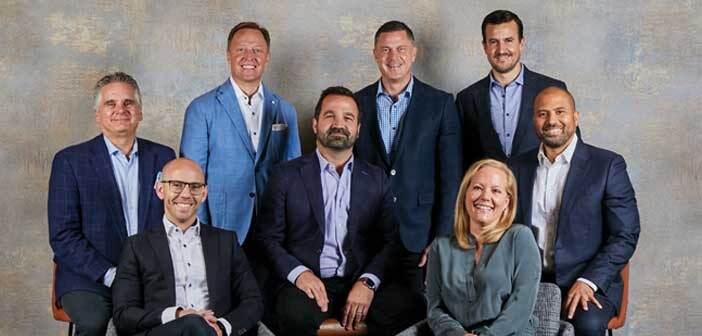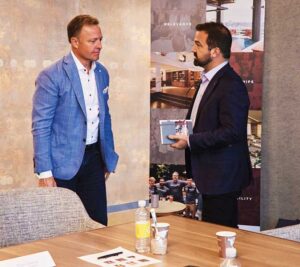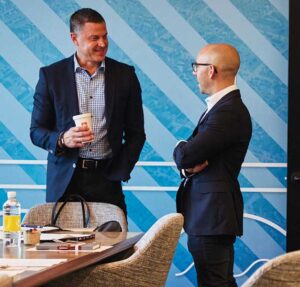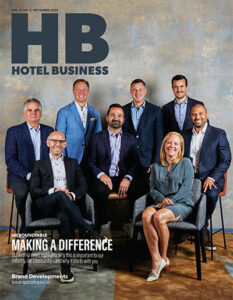Leadership event highlights why this is important to our industry, our community—and why it starts with you
Hosted and sponsored by Rockbridge, the Hotel Business executive roundtable, which was held last month, dove deep into the topics of leadership, innovation and well-being, and what they mean to hospitality in 2022. With Rockbridge’s RTRX event—held in collaboration with Pelotonia’s Ride Weekend—as the impetus for the informative discussion, industry leaders gathered to not only participate in the roundtable, but to support a cause that each one of us can get behind: raising funds and awareness for cancer research.
Created by Rockbridge cofounder/CEO Jim Merkel in 2012, RTRX began as a hospitality industry leadership event. Since then, the experience has grown and expanded to other industries, including public and private sector businesses.
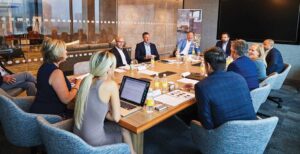
Industry executives came together to share stories and best practices about leadership, both in their companies and in their communities.
Moderated by Hotel Business VP, Content & Partnerships Christina Trauthwein, the group of roundtable participants included Merkel, along with Christine Magrann, president/COO, Makeready; Ben Pierson, managing director, development/investment, RBHD; Thom Geshay, CEO, Davidson Hospitality; Chip Ohlsson, EVP/chief development officer, Wyndham Hotels & Resorts; Kevin Davis, Americas CEO, JLL Hotels & Hospitality; Michael Coolidge, chief investment/development officer, HRI; and Alvaro Fraile, COO, Azul Hospitality Group.
“The concept [of the event]was: How do we bring our friends in the industry together to make a difference while we’re also doing business,” Merkel said. “That was the concept we had when we started it 10 years ago, and it resonated. That got us more motivated. I can’t tell you the number of stories that have come from people who have attended. We have learned about their families and the things they’re going through and it’s created deeper relationships. It makes our work more meaningful and our relationships more meaningful.”
Merkel explained that business doesn’t have to be done in an isolated way; in fact, it can be done alongside community events like RTRX that bring everyone together with a common cause. So, the goal of the event is to not only increase funds and awareness for cancer research but to enhance the lives of those who attend.
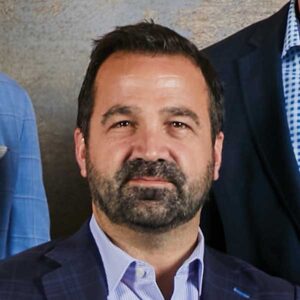
“There’s truly a community that’s been developed here and the relationships are deep. I hear the stories about taking something back and making lives better, and that really was the goal of doing something different.” —Jim Merkel Rockbridge
“I walk away every year feeling inspired to do better and think bigger and deeper,” Magrann said. “So much of the conference is not just about health and cancer—it’s really about how you can be a better leader and human. That strengthens the culture of our company because we all really do walk away grateful for the opportunity to be exposed to this type of environment.”
RTRX is truly unlike any other industry conference, with speakers that address issues ranging from the latest in cancer treatment to mental well-being tips.
“We’re all busy people,” Pierson noted. “Sometimes, it feels difficult to take a pause, but it’s really important and creates a moment in time to spend time with relationships. One of the things that’s refreshing is we spend time with the people around this table at industry conferences that are focused on the hospitality industry, and this is focused on building relationships and a bigger purpose.”
RTRX forces attendees to take a step back and put things into perspective—a critical component to a healthy work environment.
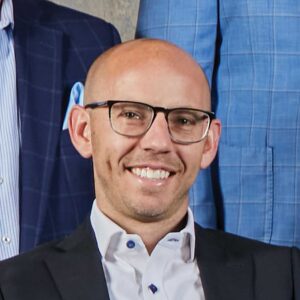
“Sometimes, it feels difficult to take a pause, but it’s really important and creates a moment in time to spend time with relationships.” —Ben Pierson RBHD
“We talk as leaders about work-life balance, and we impress upon our people that we need to do that more, yet we don’t have the diversity of thought,” Ohlsson said. “Every conference we go to, we’re talking about business and we’re raising our acumen on the business side of it, but what are we doing on the other side? When we talk to somebody about work-life balance, what does that mean? This conference does that.”
Coolidge shared similar feelings and noted that the event presents its attendees with a unique opportunity to get back into learning mode.
“We’ve all been in this industry a long time and normally, these roundtables are about the state of the industry, what’s happening with the economy, etc.,” Coolidge said. “But, being able to take that step back and listen to some great speakers and broaden your thought process and perspective is one of life’s great values.”
Davis pointed out that upon its founding, RTRX was ahead of its time, but that now it serves as a prototype for the post-COVID world and how leaders conduct their businesses.
“Pre-COVID, it was work, then everything else, but post-COVID, it’s all blended,” Davis said. “I think having an event like this where we can come together as business colleagues and also support important causes is incredibly on-point and relevant to what the world is becoming.”
The participants agreed that supporting causes like this one is a critical component of leadership—something that extends far beyond a person or title.
“As business leaders, we have a responsibility to talk more about things that don’t just require driving profits,” Geshay said. “It’s important we show and demonstrate that to ourselves and the community around us. It’s hard not to get behind something that’s touched all of us.”
This year was Fraile’s first time attending RTRX, and he didn’t really know what to expect. However—and much like all of the other attendees—the mission was close to his heart.
“The event is a big break from all of the typical lodging industry conferences, where you’re talking about business,” he said. “Here, you really pause and think conceptually about how to be a better leader and person. I’ve never been involved in an environment like this where people are contributing and donating, and it’s so much more impactful because of that. My dad is a cancer survivor. I’m one of the lucky ones.”
Although in its 10th year, Merkel knows the event is just getting started and growing stronger with each year.
“There’s truly a community that’s been developed here and the relationships are deep,” he said. “I hear the stories about taking something back and making lives better, and that really was the goal of doing something different. We are just getting started in this community with this type of event in our industry. It’s not just us and our colleagues, it’s all of us. We encourage people to bring their children. That’s a whole other dimension of bringing your whole self.”
Leadership is a mindset
One of the pillars of the roundtable discussion was leadership, and what being a leader looks like in 2022 and beyond. Although the pandemic has affected how leaders guide their teams, the fundamentals of leadership remain.
The panelists all agreed that being a leader isn’t about a person and his or her title, but a mindset—how you motivate, inspire and help others grow.
For Magrann, being a leader means creating a transparent culture and building trust so that employees feel comfortable in their environment.
“When people don’t feel confident that they can speak up at work, or when there isn’t an environment they can trust to be open to a different opinion than that of the person sitting across the table, it’s hindering the progress and innovative qualities that we’re all looking for,” she said. “We spend a lot of time being thoughtful, trusting and getting deeper into that so everyone can be their best selves.”
But, trust in the workplace extends far beyond driving results; it begins with a person.
“For me, it’s all about authenticity,” Davis said. “We are a much less formal society than we used to be. I think it’s important—particularly for younger people—to see a leader as a whole person. Not person on a pedestal who always knows the answer. I’m happy to say that I don’t always know the answer.”
When leaders display this kind of authenticity, it not only creates a level of trust, but also makes employees feel heard and that their opinions carry weight.
Fraile told a story about former Marriott International CEO Arne Sorenson, who was known for giving others his full attention.
“Arne would give you 100% of his attention,” he said. “He wouldn’t be telling you what to do or how to solve a challenge; he would be asking you questions and listening to your answers. Then you would walk away not thinking, ‘Wow, this guy’s really smart,’ but ‘I’m really smart.’ It achieves two things: It makes you feel important, heard and appreciated. And, he’s also getting a ton of information because he’s asking everybody these questions, whether an owner or a housekeeper. The higher you are in an organization, the more you can lose touch of how people feel.”
How leaders make people feel is critical here, as that is what lasts and what people remember. Merkel noted that people naturally want to follow leaders who create safe spaces for employees, and that, in turn, creates strong bonds.
“I’m sure if you asked everybody here, getting the next dollar is not their proudest moment. It’s those relationships you build with your team members,” Merkel said. “When you build those relationships, everybody wins and grows. Mentorship, servitude, leadership—you grow as a person, and what’s so rewarding is seeing team members and the relationships built and continued beyond. We wanted to create an organization where people are close. Doors are open and people can be vulnerable—we encourage that. Building that environment is part of leadership.”
But creating this environment isn’t always easy. It takes time and dedication.
“You can’t do it when you need it—it’s too late then,” Pierson said. “You have to build relationships over time. If you’re just now building that team and that trust, it’s too late.”
So, exactly how are these relationships forged? Sure, spending years at the same company can naturally build trust and solid relationships, but one of the ways is through something even more powerful—storytelling.
“Storytelling isn’t delivering facts,” Pierson said. “You’re not telling people they’re going to make more money or are going to advance in their career. It’s important how you make them feel, so that’s why storytelling is so important. If you change the way somebody feels, you may change their life forever, change their loyalty or change how they’re going to behave. That’s hospitality—how you make people feel.”
Storytelling can also have the power to change perspectives outside of one’s company, or even outside our industry.
“Stories are everything,” Geshay noted. “When you start with design, you start with the story. We know that. But it can also help solve the staffing problem. I started as a bellman with Davidson when I was 17 years old. Those stories aren’t unique. Very few people set out to be in hospitality. Many important leaders in our industry started as dishwashers or bellmen. It’s an industry where you can create a great career without having a specific education.”
Geshay, along with the other participants, agreed that the industry should be more intentional with telling these stories going forward to elicit excitement for an often-overlooked career path.
“Grad students are so focused on their careers, but they have it all wrong,” Merkel said. “Go where you’re going to learn the most and then put your everything into that job. If that organization doesn’t recognize it, somebody who does business with that organization or somebody who meets you will, and your career will get to the right place.”
Ohlsson noted that another challenge with the younger generation of workers is that they expect success very early on in their careers.
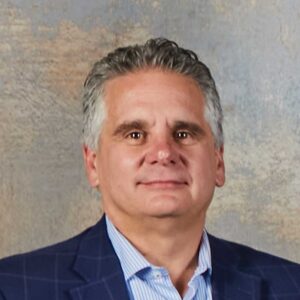
“The reality is: I want the people who aren’t afraid to fail…it’s OK to be wrong and that we’re all wrong at some point, but we’re going to work together to make it the best we can.” —Chip Ohlsson Wyndham Hotels & Resorts
“They’re so afraid to fail,” Ohlsson said. “The reality is: I want the people who aren’t afraid to fail—I need you to fail. [We need to make] an intern or someone new in the company understand that it’s OK to be wrong and that we’re all wrong at some point, but we’re going to work together to make it the best we can.”
Leaders also have their fair share of failure, but that’s ultimately what breeds growth. Even long-term, leaders can take years to settle in.
“I’m not a religious person, but a lot of people in my family are, so what they say is, ‘If you want to make God laugh, tell him or her your plan because it never works out that way,’” Davis said. “As I talk to young people, it’s shocking because they’re so programmed. Go out, work hard, make relationships and find the thing you absolutely love that maybe you’re a little bit better at than other people—and then chase it 1000% because you will excel.”
Coolidge shared a similar outlook, explaining that what seems like the most prestigious job may not be the most rewarding one.
He said, “One of the best pieces of advice I ever got was from somebody who said, ‘Don’t worry about what the title is, what the job is. Go where you’re going to learn the most. When you get out of school, go where you’re going to be around executives and get exposure. Don’t get the Wall Street job or the title, but be around people you’re going to learn a lot from.’”
Merkel agreed and noted that the next step isn’t always handed to you. Sometimes, it’s just about small steps and accomplishing that next hurdle.
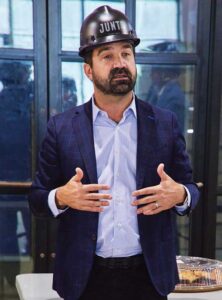
Rockbridge CEO Jim Merkel (above) took Hotel Business roundtable participants on a special hardhat tour of one of the company’s new developments, The Junto.
“Getting a job and making money…it doesn’t mean you’re going to be happy,” Merkel said. “I think our industry does a very poor job of selling our industry as a career, and it’s really fascinating. The storytelling is important, but internships and mentorships in our community are also important… When people see other people and what they do in their environments that they’re unaccustomed to, they learn that this isn’t rocket science and that they can do it, too. That’s what I love about our industry.”
Aside from storytelling, another responsibility of leaders is to empower and inspire their teams.
“I’m sure we’ve all had bosses in our careers who just tell you what to do,” Fraile said. “But it goes a long way when you empower your people to make decisions. Then it becomes a philosophical conversation. Give them the power to make decisions.”
However, younger workers today struggle not only with fearing failure, but with being bold and direct in their jobs, Magrann noted.
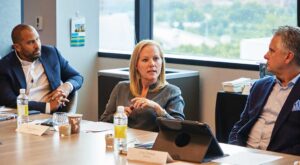
LEFT TO RIGHT: Kevin Davis, JLL Hotels & Hospitality; Christine Magrann, Makeready; and Chip Ohlsson, Wyndham Hotels & Resorts
“Being really direct and transparent with feedback is a huge part of mentoring, grooming and developing people,” she said. “[Young workers] want to move so fast and have stepping stones and know how to get there, but I think it’s important to take the time to sit down and have a casual conversation on how to be better. It doesn’t always have to be so formal.”
Pierson said that although younger employees shouldn’t be afraid to fail, be bold or have an opinion, it’s essential for them to back up that opinion.
“One of the things I always tell people who work for me is, ‘Have an opinion, but make sure you don’t throw something out there just to sound smart,’” he said. “Own it.”
Ohlsson comes from the same school of thought that everyone should express their opinion, but it’s ultimately the leader’s job to then stand behind it.
“Young workers fear that they’re going to put their opinion out there and it goes badly,” Ohlsson said. “At the end of the day, I’ll own that decision but I want to hear your opinion, so give me your opinion, tell me everything you’re going to do, and when it comes time to pull the trigger, if it works, you’re getting all the credit because it was your opinion and your idea. And if it fails, well then I voted for it, not you, so I’m going to take all the heat and responsibility for it.”
With differences of opinion comes disagreements; however, the participants agreed that conflict isn’t always a negative.
“Conflict breeds better decisions,” Merkel asserted. “People should feel comfortable to disagree. Sometimes, disagreements are uncomfortable and feel personal but if the trust is there, it’s OK to come forward.”
Ohlsson said that he challenges every opinion he asks for to see how passionate team members are about that opinion.
“Don’t sit there and preach,” Geshay added. “Ask good, insightful questions and the team will come to a better resolution.”
Create an emphasis on well-being
The RTRX event surely puts a lot into perspective for all who attend, but how does this align with leadership? Post-COVID, there’s an increased emphasis not only on physical, but mental well-being.
The shock and devastation of encountering something so foreign—plus the isolation of remote work—has impacted how the world views mental health.
Companies are now looking for ways to foster a healthy work environment and one that encourages mental well-being.
“We’re looking for ways to enhance employees’ lives with something maybe they wouldn’t spend money on,” Fraile said, explaining that his company offers a choice of options for team members like personal trainers, financial advisors and music lessons to better their lives.
“I think well-being is defined differently for everybody,” Geshay said. “In our companies, we have to provide the framework for people to figure out what’s best for that. We can’t tell them what to do or how to do it, we just have to meet them where they are. It’s important to maximize their personal potential with initiatives like philanthropy and mentorship programs.”
In fact, well-being and how it’s defined can mean something different for each employee, as there’s diversity throughout each organization.
“The majority of our workforce is Latin women, so you’re making a decision about what’s best for them and that’s why it’s individualized because you’re not them,” Ohlsson said. “But having that diversity of thought is helpful,” Ohlsson said. “It’s OK that wellness is self-serving. We look at it from a perspective of burnout. It’s so real. It’s not about work, work, work. We’re big on vacation time. We’re in the hotel business, and we should be pushing people to take vacations. Just find out what special need there is for that individual, and you can extend their career and not have to replace that person.”
Merkel said that Rockbridge is growing the size of their office and has dedicated a third of its 27,000 sq. ft. to social spaces and different ways people can work. The company also wants to create a place that’s very residential in feel—a home away from home.
“A big part of well-being is creating positive environments and a place where people want to be that’s inclusive,” Merkel said. “The responsibility is to create those places. The environment isn’t just physical—it’s also mental and emotional.”
Those in the workforce also wants to see—and trust—that companies are valuing their mental well-being with real, concrete programs.
“People want more tangible things now,” Magrann said. “It’s about what you are doing to create structure that’s focused around mental well-being. We amped up to quarterly check-in conversations every week, and we start with personal and professional bests. It’s more helpful than annual surveys.”
Coolidge said that HRI does personal check-ins as well, which are less about the company and more about making people pause, adding, “Even if it just makes people stop and think for a moment: How are you doing?
How are you feeling about work and the world? It creates a check-in with yourself. The hotel side and property side are so prone to burnout.”
While these internal offerings and programs help, they’re not always enough. Sometimes, creating—and subsequently, fostering—a healthy work environment begins with the leaders themselves.
“I’m a very optimistic person, so I might miss somebody going through a hard time, or it’s hard for me to understand sometimes,” Magrann said. “Over the past two years, I’ve had to take a minute, pause, make sure I’m really listening and asking the right questions because I move fast. It’s really about slowing down and understanding that we’re all very different.”
Similarly, learning the difference between sympathy and empathy was big for Ohlsson.
“If I hear about something somebody is going through, the problem I always had was I was sympathetic to what it was, not empathetic,” Ohlsson said. “I’d put myself in their situation and feel what I would feel, as opposed to putting myself in the situation and feeling what they would feel. That is the big difference—trying to find that balance.”
However, it’s difficult to be empathetic when workers struggle to share personal details.
“You can’t have empathy if they won’t share,” Pierson said. “It’s important to find ways to elicit that comfort so they share. Not everybody’s the same. You can’t help and be available for someone if they won’t share.”
Communication and engagement can help here, Coolidge said, so people feel valued and heard.
“People are often remote, so figuring out ways to make people feel engaged is a way to help them feel important and significant,” Coolidge said. “It should have been the case even before [COVID], but the engagement creates the culture.”
Innovation of thought is key
For Ohlsson, COVID taught him the importance of three things: culture, collaboration and communication. Those three things became so paramount to him and his team because they didn’t realize how much collaboration was needed.
Every participant on the roundtable learned something from COVID, especially the importance of innovation, no matter how big or small.
“I really used [COVID] as an opportunity to learn and to push my team to be bold and be willing to take risks,” Davis said. “I’ve learned more in the past two-and-a-half years than I’ve learned in my career because we were all confronted with situations that we had never been confronted with before. So, we had to figure out how to respond. For me, it was a tremendous learning opportunity. Push the boundaries, and you should come out of this with a skillset that you didn’t have before that will make you that much more valuable to the organization.”
Innovative technology and innovative leadership tactics are key for sure, but so is innovation of thought.
“Innovation…people think of technology and building something new, but it can be really simple, and it’s about being curious and thinking about the way we’re doing things differently,” Merkel said. “Slight tweaks on perspective that we try to challenge ourselves on. It doesn’t have to be rocket science; it can be a simple change on perspective. During COVID, you started to look at your practices differently. It’s not earth-shattering. It’s important and a form of improvement. I think innovation is just identifying ways to be better.”
Diversity of thought is essential today, but it’s always been there. But now, organizations are valuing the opinions and recognizing the burdens of their entire workforce, knowing how it can enrich their communities.
“Those ideas have been there all along, but giving the voice to the people who weren’t heard before and getting their voices heard is very important to our organization,” Ohlsson said. “Hearing other perspectives, we think, is innovative, but they’ve been sitting there all along.”
The industry is ripe for innovation, whatever that innovation may be. And, although hospitality is notorious for being slow to adopt change, innovation really doesn’t need to be intimidating.
“I don’t think there’s been a time where the ground has been more fertile than it is today,” Davis said. “Young people want meaning to their work. Having meaning above and beyond economics is important. We need to do more of this because people want it. During COVID, when work and personal lives were blended, it all became one.”
Although the roundtable participants are all from different companies, they share very similar perspectives. And an event like RTRX brings these perspectives together, helping to foster innovation.
“As leaders, we have a responsibility to do more than just drive profits,” Geshay said. “Now, more than ever, we have to take advantage of this surge of people who want to feel more included, be more engaged and change business for good. We have to tell the stories.”
Leadership, well-being and innovation are all fueling the future of our industry, but, at the end of the day, it’s truly the people who enrich hospitality and make the industry what it is and keep the workforce solid.
For Merkel, he prides himself on the community that RTRX has built, and he gives all the credit to the people.
“It’s the organization, the team, the community that comes together to make it really happen,” Merkel said. “Everybody around this table has made this event happen. We just set the spark, but it’s what people want. They want more meaning in their work and in their lives. What are we doing all of this for? I think everybody here has innovated by making it important to be here.”

